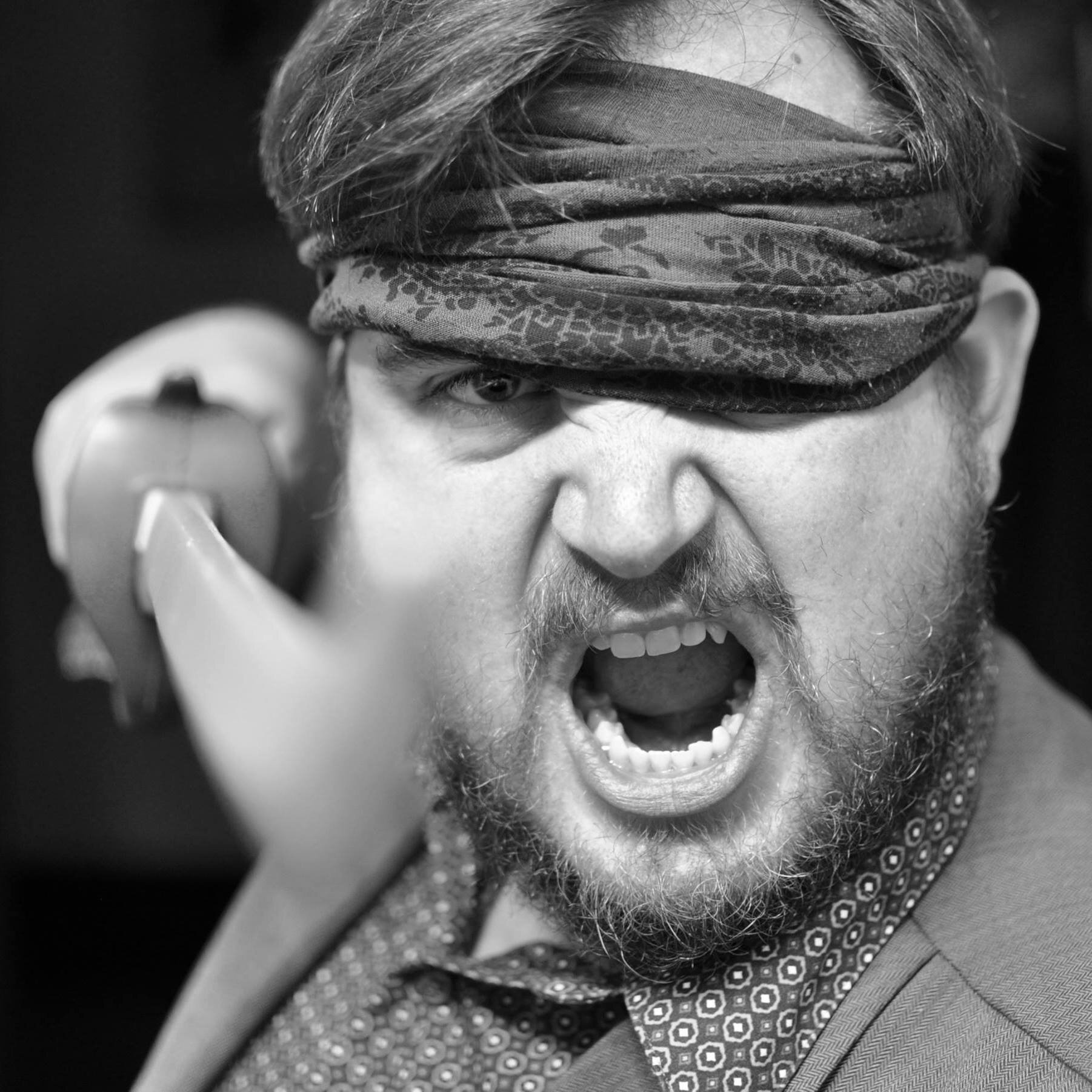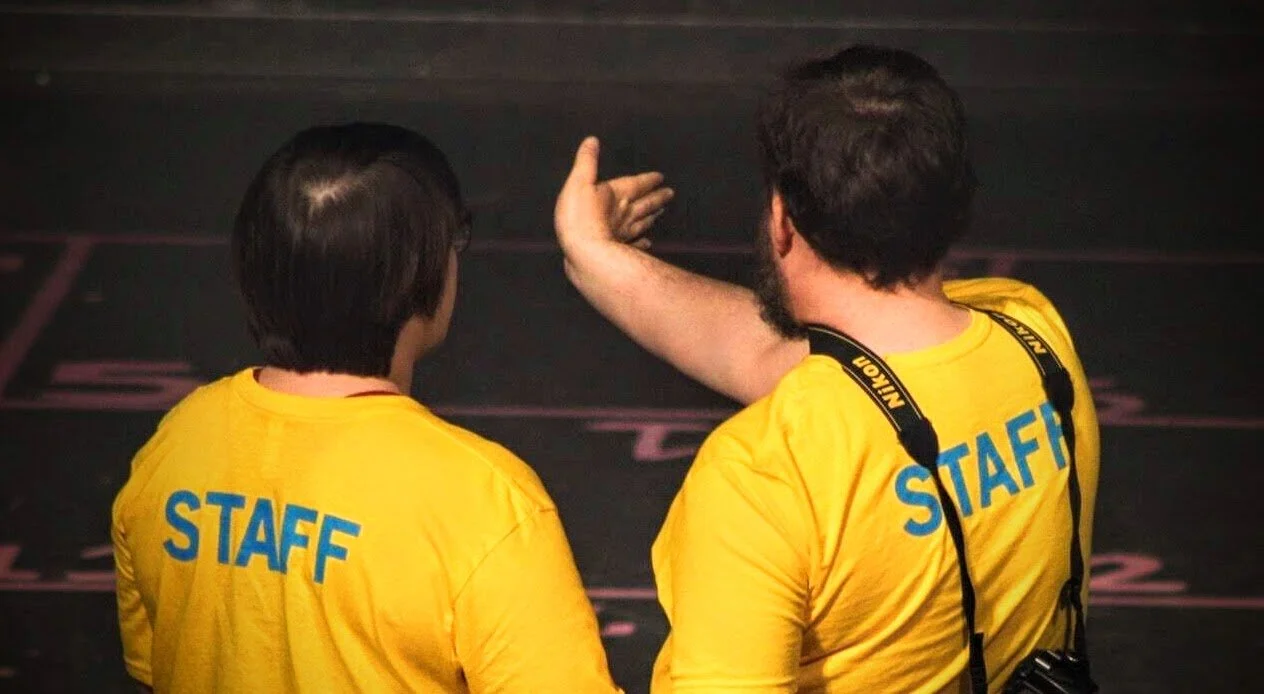For the Common Good: A Community Arts Leader Interview with Andy McGuire
Andy McGuire, Education Director of George Daily Community Auditorium, Oskaloosa, Iowa.
This week’s interview continues to capture the creative and community-centered genius that Andy and Allison McGuire discover and harness in the Mahaska County communities through their work at George Daily Community Auditorium. I met Andy and Allison in 2017, and have had the pleasure of working with and learning from them in various ways over the years. They gave an extraordinary guest lecture/workshop in one of my upper-level community arts studio courses a few years back. (All you non-theatre artists: PSA that theatre games are SO FUN.) Last week, Allison shared her experiences and philosophies of working as an arts leader with and in a rural community. Today, we’re hearing from Andy, a terrific theatre-maker, educator, and community development guru.
Andy McGuire arrived in Oskaloosa in 2012 to be the Auditorium's first full-time Education Director and now serves as the Executive Director. Andy is the Past-President of the Board for the Mahaska Chamber and Development Group. He also is an adjunct instructor and director at William Penn University. After earning his B.A. in Theatre in 2010 from Central College in Pella, Iowa, He toured the Midwest as an Actor-Educator for Climb Theatre out of the Twin Cities and taught for the Emerald City Theatre in Chicago.
(Beyond his career, Andy enjoys photography and film and audio production. He always loves stories about anything unknown, like UFOs or Bigfoot – the weirder, the better.)
Theatre Games. For real, best thing ever.
Who are you in 10 words?
Educator, Community Developer, Director, Arts Administrator, enthusiast of the unknown.
What community rituals do you value?
Our community has one of the longest running city bands in the Midwest. It has been performing music for our community for over 150 years and it took a global pandemic to cause a break in the ritual. The concerts on the square are like sitting down to our community’s own collective front porch. People bring lawn chairs and enjoy the summer breeze while children are dancing and playing around the bandstand. Families have patches of the square they’ve all sat in for multiple generations. It is like the Field of Dreams, but it’s about music instead of baseball. I love it.
Oskaloosa City Band and Bandstand. Photo credit: Oskaloosa News
How do you approach your community work creatively?
I suppose the best way to describe an approach is that I try not to have an approach. Over the past few years, I’ve learned that when I force anything to my design, it is a much more challenging journey. Instead, it is really trying to understand all of the elements of the community ecosystem and letting the project and the ecosystem determine the course of action. Most of the time, this yields a better project than whatever approach I’m determined to use.
How has that changed in the last year?
For about a year, all our work was done from home. This has led to huge feeling of disconnection from the community. One of my favorite parts of the job is when we are out running an errand or grabbing a coffee, we can catch someone in between moments. Often, I find this is exactly the person I needed to see. Not having those moments has been tremendously challenging to be without. On the other hand, we have found that our organization is more than just a theatre venue. We’ve found some interesting ways to connect with people and that the value in what we do doesn’t always tie back to how many shows someone sees in a season. It’s really refreshing to see value beyond something transactional. I look forward to returning to the life of our building, but I also look forward to building partnerships based on the genuine development of our community and not just the transactional nature of business as usual.
Haunted Village, a drive-thru haunted house on Halloween 2020 collaborated by Oskaloosa High School Thespians/Drama, Oskaloosa Community Theatre, and Nelson Pioneer Farm.
How has serving as a community arts leader impacted you?
Anything I’d learned in college about anything did not necessarily tackle life as a community. Sure, everything about theatre is about success as team and a team is always a community, and we learn the basic conventions of our art and how to incorporate cross-curricular methods to what we work on. But, we usually approach it on how to keep art alive. Now, I find that the focus should be what we can do to keep community alive. If the community thrives so too does our organization and all the other businesses. Mahaska County is the first place I decided on adding new license plates to my vehicle, it is the only other place I’ve considered “home” enough to register my vehicle. Working as a community arts leader has helped connect to a place and its people and that keeping art alive isn’t always worthwhile without a community to engage in that art.
What has been your hardest community lesson?
There are a million projects and there will always be a million projects, but long-term lifespans of organizations are building on lots of little. Structural and organizational progress makes the environment for projects to continue to be successful and build a better path for the next person.
What tips might you have for artists who want to dive into community work?
I often wonder, “is it better to have all the answers or all the questions?” Rural communities want to be seen as just as vital and legitimate as urban areas. It never seems to work as well when you come in with all the answers. Even as I’ve spent the majority of my professional life here, I’ve grown wary of anyone that claims to have all the answers.
It takes just as much business sense as artistic sense to make meaningful change.
What would you like your community to understand about the arts and artists?
The complexity and value of arts and artists is not solely confined to creative expression for children. Yes, there is absolute educational merit, but it is applicable to all people at all ages, and it is also a tool for community development beyond creative expression. Imagine a big white board with the community’s problem at the center, let’s say it is housing (a huge discussion point in many communities). Around the problem, start filling in the different sectors that can be used to help fix it. You will find the following things represented: city/county governments, businesses, industrial/manufacturing leaders, education programs through both colleges and high schools, etc. Arts and Artists can definitely have a place to help solve a portion of the problem. It could be as simple as the communication strategies or design elements, or it can be as complex as using artists or arts groups to help supplement the thinly spread contractors to make completely unique housing options out of the dilapidated housing stock (to go with our example).
George! was staged for the 20th anniversary of the Auditorium. It is a musical about the life of George Daily and his place in the history of Oskaloosa, written by an amazing woman named Iola.
Learn more about George Daily and the way his life affects the ethos of the Auditorium here.
What tips might you have for communities to better support artists?
Find a way to let people be who they are. The environment is more important than the artists or the businesses. A good environment that supports all people will attract those who will help lift your community. A balanced ecosystem is necessary in all forms of life. Everything must be a counterweight to something else and too much of anything can be damaging to something else. For every liberal in politics, there ought to be a conservative. For every creative thinker, a practical one. It (the ecosystem) could take one to dream, another to plan, another to build, another to use, and everyone must be responsible to clean up, but if you have too many dreamers ,or planners, or builders (etc.), it gets out of balance and doesn’t quite spin right until it eventually crashes.
It takes just as much artistic sense as business sense to make meaningful change.
Andy in the wings, mid-show.
What motto or creed do you live by?
I try to think like Tree Ents from Lord of the Rings - they take a long time to say anything and they never say anything unless it is worth taking a long time to say.
Real change can take a long time to make, but I don’t want to work on anything unless it worth taking a long time to make.
Connect with Andy at youth@georgedaily.org , on Facebook and Instagram, and learn more about Andy and Allison’s creative work at Unfinished Ink. Learn more about the work at George Daily Community Auditorium on their website and on Instagram.
Allison and Andy McGuire planning at theatre camp, George Daily Community Auditorium, Oskaloosa, Iowa.
Like learning about the ins and outs of being a community artist or a community arts leader? Check out interviews with artists Akwi Nji, Catherine Reinhart, Jordan Brooks, Reinaldo Correa, Kristin M Roach, Rami Mannan, and Jill Wells, and interviews with community arts leaders Amber Danielson, Allison McGuire, and Jennifer Brockpahler.
Have a phenomenal community artist or an inspiring artist leader to suggest? Comment below or email jennifer@whatsgoodproject.com.







